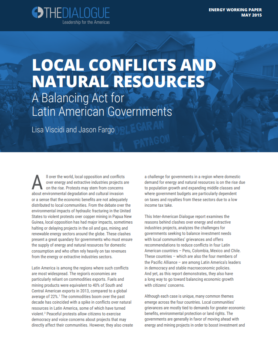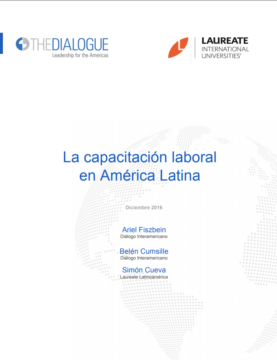
Local Conflicts & Natural Resources in Latin America
Conflicts over energy and natural resources are leading to social turmoil and posing serious challenges for investment projects all over Latin America.
Mexico has no shortage of skilled workers but needs to better align the qualifications of its graduates with the needs of the energy sector, according to speakers at an Inter-American Dialogue roundtable in Mexico City on April 28.
“Our universities need to better align their curriculum offerings to help meet private sector needs and ensure that students are prepared for their careers,” said Carlos Ortiz, General Director of Research, Technological Development and Human Resources at the energy secretariat.
With the energy reform expected to bring tens of millions of dollars in investment over the next three years, a shortage of qualified labor would increase competition for talent among companies and government entities.
Yet, Mexican universities currently do not produce enough energy engineers, geoscientists, and other qualified labor to meet this additional demand due to a relative scarcity of programs and low matriculation rates. Existing programs must also be strengthened and evaluated; currently only 14.2% of higher education programs in Mexico are accredited by the Consejo para la Acreditación de la Educación Superior.
The Dialogue roundtable brought together speakers and participants from government agencies, such as the secretaries of energy, education, foreign affairs and finance, as well as educational institutions and companies, to discuss this challenge and propose solutions.
Speakers stressed the importance of strengthening institutional links between universities and the private sector.
Javier Treviño, Undersecretary for Education Policy, said that overcoming the skills gap would require extensive cooperation between universities, the private sector and government. Many programs focused on energy-related fields have been designed from the academic perspective, only tangentially considering the skillsets needed by the energy sector.
Treviño, formerly a congressman on the energy committee, where he played a key role in garnering congressional support for the constitutional reform, noted that 80% of the 135,000 specialists needed as a result of the energy reform will require technical or vocational training. The remaining 20% will require advanced degrees.
Despite these challenges, the reform also represents an opportunity for Mexico’s labor force.
“We can use the energy reforms as a catalyst for the development of our educational system and to promote STEM careers and language acquisition,” said Bernardo González-Aréchiga, rector of the Universidad del Valle de Mexico, which has dozens of technical training programs in energy-related fields.
The opening of Mexico’s energy sector can promote job growth throughout the supply chain through development of local suppliers, according to Alberto de la Fuente, President and General Director of Shell Mexico. Shell has implemented numerous programs to develop local suppliers all over the world.
The participants agreed that as Mexico prepares for an energy boom in the coming years, human capital development could pose a major barrier but could also bring great benefits to the country.
The forum was made possible thanks to the support of Laureate International Universities and Shell, as well as the Energy & Resources Committee. For more information on the roundtable agenda, click here. See news coverage of the roundtable in El Semanario, Notimex and Economíahoy.mx.
Sponsors
Partner Institutions
Conflicts over energy and natural resources are leading to social turmoil and posing serious challenges for investment projects all over Latin America.
Online competency-based education (OCBE) has emerged as a viable option to help reduce the skills gap in the Americas
The low skills levels of Latin America’s workforce have led to productivity issues that limit the region’s growth potential.
 Inter-American Dialogue/Comexi/American Chamber of Commerce of Mexico
Inter-American Dialogue/Comexi/American Chamber of Commerce of Mexico

